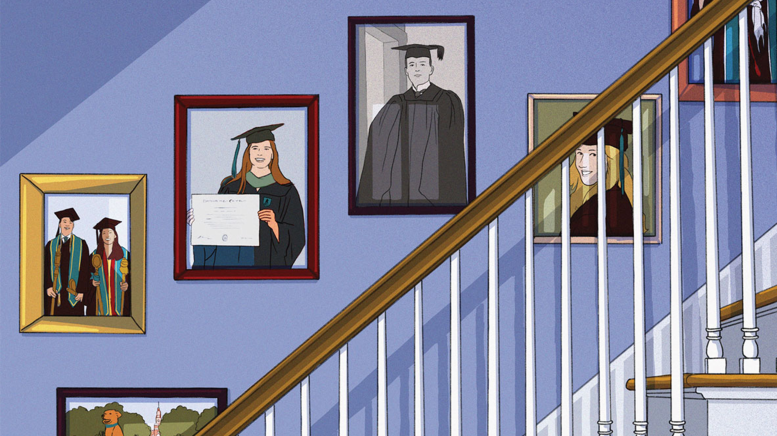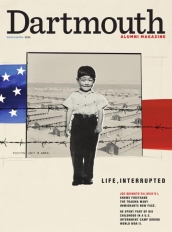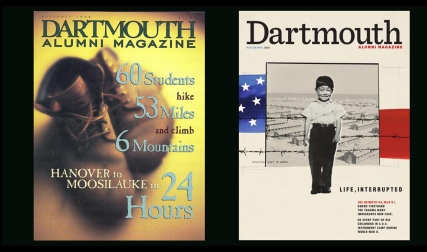The Quota Era
I sincerely appreciate the letter from Matthew Skrod ’24 [“More Legacies,” January/February] that shines a spotlight on Dartmouth and other Ivies having a Jewish quota during the 1930s. That decade of shame was thankfully ended by President John Sloan Dickey, class of 1929.
BRUCE R. PFAFF ’76
Barrington Hills, Illinois
In his letter, Skrod references a monograph he completed in 2023 during a Historical Accountability Student Research Fellowship. I’m grateful that he made the effort to do his research and share some of his observations. To the best of my knowledge, I personally experienced little or no animus, either in the admissions process or in my daily life in Hanover. My only specific recollection concerns a comment I overheard one late afternoon as I walked back to my dorm, probably sometime during either 1967 or 1968: “Oh, he’s the Jew from Middle Mass.” I was truly surprised. I spun around but was unable to identify the person who voiced the assertion.
ALAN GORDON ’71
Portsmouth, New Hampshire
Language Police
I felt delighted to read about the discovery of John Jacobs’ memoir [“Six Hundred Thousand Despots: Jonathan Schroeder ’03 Discovers an Astonishing Account of Slavery Written 170 Years Ago,” January/February]. Rand Richards Cooper’s article, however, gives me an opportunity to suggest that DAM editors be mindful of opportunities for embedding powerful language for the benefit of the readers, who might be moved by the expansive way we can come to see and understand our world.
I wonder if, instead of publishing a sentence containing the phrase “he came across a treasure: a two-part, 20,000-word memoir by a former slave from North Carolina,” a DAM editor could ascribe the agency due John Jacobs, perhaps like this: “a two-part, 20,000-word memoir by a formerly enslaved, self-emancipated man from North Carolina.”
The word “slave” objectifies the man quoted on the first page of the article, writing of himself, “No law can make property of me.”
CATHERINE BROWN DOUGHERTY ’83
Berryville, Virginia
Saving Grace
I absolutely loved “Extraordinarily Ordinary” [January/February] and how much you can learn about a person through letters and keepsakes. I am an admitted pack rat and save every ticket stub, theater program, and restaurant receipt—much to the dismay of my husband.
David Mason Eichman ’82
Los Angeles
For Better, For Worse
Regarding “Family Ties” [September/October], my wife, Dr. Cynthia Anderson Hansen ’99, was a legacy student at Dartmouth. I was not. Casting aspersions on the legacy system will not help me sustain a happy marriage. But I cannot speak favorably of a system that worked against me twice over: No one in my family had ever attended Dartmouth, nor had anyone from my public high school.
Over our four years at this little College on a hill, my closest friends were surprised to learn I had been waitlisted at Dartmouth. I did not advertise the fact. I was the top engineering student in our class. How did I almost not make the cut?
Everyone in the admissions process—students, parents,
College staff, references, interviewers—works hard to sustain the illusion of merit. Legacy preferences make plain the ruse. Admitting qualified applicants by lottery would be no worse than what we have today. The odds of my wife and I meeting at Dartmouth would still have been quite good.
PATRICK R. HANSEN ’97, Th’97
Grinnell, Iowa
A Fan’s Notes
The remembrance of John Wilmerding by Denis O’Neill ’70 [“The Voyager,” September/October] brought to mind the professor’s lectures—nonstop elaborations on great works of art. His enthusiasm kept most students fully engaged, except one who was once seen sitting in the front row of Art 1. In the middle of describing a work projected on the screen, Wilmerding glanced down and questioned the student, “Don’t you take notes?” and without skipping a beat continued the lecture. The unnamed student sheepishly reached down and slowly brought a notebook up to his desktop and began to take notes.
Wilmerding’s interest in his students extended beyond the classroom. Years after graduation, I read of a new focus on the works of Matisse, considered a somewhat lesser Impressionist during my student years. I inquired with Professor W. about the change and received a two-page handwritten explanation. He was a great teacher and one whose competence as an instructor was enjoyable.
DWIGHT MACOMBER ’70, Th’77
Alexandria, Virginia



